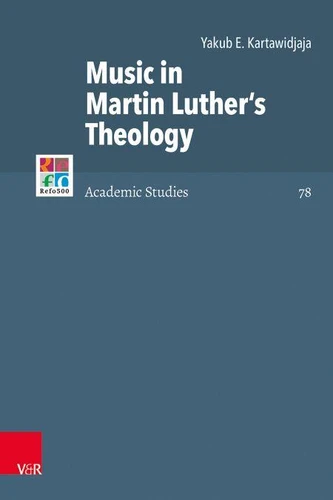Music in Martin Luther's Theology
Par : , , , ,Formats :
Disponible dans votre compte client Decitre ou Furet du Nord dès validation de votre commande. Le format PDF est :
- Compatible avec une lecture sur My Vivlio (smartphone, tablette, ordinateur)
- Compatible avec une lecture sur liseuses Vivlio
- Pour les liseuses autres que Vivlio, vous devez utiliser le logiciel Adobe Digital Edition. Non compatible avec la lecture sur les liseuses Kindle, Remarkable et Sony
 , qui est-ce ?
, qui est-ce ?Notre partenaire de plateforme de lecture numérique où vous retrouverez l'ensemble de vos ebooks gratuitement
Pour en savoir plus sur nos ebooks, consultez notre aide en ligne ici
- Nombre de pages216
- FormatPDF
- ISBN978-3-647-56553-8
- EAN9783647565538
- Date de parution12/04/2021
- Protection num.pas de protection
- Taille5 Mo
- Infos supplémentairespdf
- ÉditeurVandenhoeck & Ruprecht
Résumé
The study aims to analyse the impact of Luther's theology on his thoughts about music. It limits itself to an analysis of the topic by focusing on the three most important statements of Luther about music in his unfinished treatise ???? ??? ???????? [On Music]. The first statement is that music is "a gift of God and not of man" [Dei donum hominum est], second, music "creates joyful soul" [facit letos animos], and third, music "drives away the devil" [fugat diabolum].
The relation between these three statements to each other and to Luther's theology in general can be understood in connection with his personal experiences and commitments to music, which were undergirded by his theology. Luther, as a man of medieval times, took for granted the existence of the devil, and many of his writings contained frequent references to the personal attacks of the devil, where it influenced his thoughts about music.
The relation between these three statements to each other and to Luther's theology in general can be understood in connection with his personal experiences and commitments to music, which were undergirded by his theology. Luther, as a man of medieval times, took for granted the existence of the devil, and many of his writings contained frequent references to the personal attacks of the devil, where it influenced his thoughts about music.
The study aims to analyse the impact of Luther's theology on his thoughts about music. It limits itself to an analysis of the topic by focusing on the three most important statements of Luther about music in his unfinished treatise ???? ??? ???????? [On Music]. The first statement is that music is "a gift of God and not of man" [Dei donum hominum est], second, music "creates joyful soul" [facit letos animos], and third, music "drives away the devil" [fugat diabolum].
The relation between these three statements to each other and to Luther's theology in general can be understood in connection with his personal experiences and commitments to music, which were undergirded by his theology. Luther, as a man of medieval times, took for granted the existence of the devil, and many of his writings contained frequent references to the personal attacks of the devil, where it influenced his thoughts about music.
The relation between these three statements to each other and to Luther's theology in general can be understood in connection with his personal experiences and commitments to music, which were undergirded by his theology. Luther, as a man of medieval times, took for granted the existence of the devil, and many of his writings contained frequent references to the personal attacks of the devil, where it influenced his thoughts about music.



